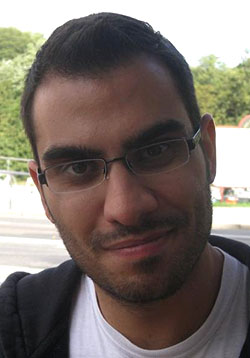"It's about selecting the right trade-off"
Published Sep 30, 2013
Georgios Varisteas from Greece came to KTH for master studies in distributed systems. He continued with PhD studies and has now defended his licentiate thesis "Cooperative user- and system-level scheduling of task-centric parallel programs".

Where are you from and where did you study before coming to KTH?
– I was born and raised in Athens, Greece. I started my studies at NTU Athens, acquiring a MSc equivalent diploma in Applied Mathematics. I then continued at KTH, in the Software Engineering of Distributed Systems Masters programme before becoming a PhD candidate at School of Information and Communication Technology.
What is your topic and why did you choose it?
– My research topic is scheduling abstractions and programming models for massively parallel multiprogrammed systems in conjunction with the Barrelfish OS. The motivation for choosing this field was the great new challenges that surround it. They are stemmed from the radically new architectural designs, ensuing a necessity to rethink the whole software stack in order to maximize efficiency. It is becoming more and more apparent recently, that the software development and deployment practices used till now, are sub-optimal when it comes to the new multi-/many- core systems. The questions being answered are not only new and demanding but also necessary for continuing to successfully push the limits of computing.
Describe your topic in short.
– Imagine the task of reading a book. A single reader would start from the beginning and continue till the end, page after page. Employing multiple readers requires synchronization, to split the book appropriately so that no overlapping is done and eventually sync their results together. Add to that interdependencies, like chapter 5 cannot be read before 3 has finished. This is an simplified analogy of single- and multi- processor systems, with the book being a parallel application. Now imagine the same multiple readers, having to read multiple books of varying sizes simultaneously, while maintaining the same performance criteria and complexity due to dependencies. Scheduling these tasks becomes very complicated. In effect my research is about minimizing wastefulness in allocating resources while simultaneously maximizing the utilization of such systems, through scheduling.
Tell us something about your results.
– After investigating and implementing the state of the art, I decided to move to a new direction, which under certain but general enough conditions, has had very promising results. However it touches several layers in the computational stack, from the operating system, to the application runtime as well as how we write parallel applications; thus it contributes to the trend that a vast restructuring of several of these layers is unavoidable.
What will the future bring for your research, how will you continue and what focus will you have on your PhD thesis?
– My research is multifaceted, as it requires investigating many distinct layers. I am satisfied with the progress so far but its general applicability remains to be seen; a concrete conclusion cannot be drawn until all layers have been thoroughly investigated. I believe that complexity depends on the perspective approach to the problem. It's about selecting the right trade-off between high- and low- importance factors. Such a distinction usually means appropriately restructuring the problem.

